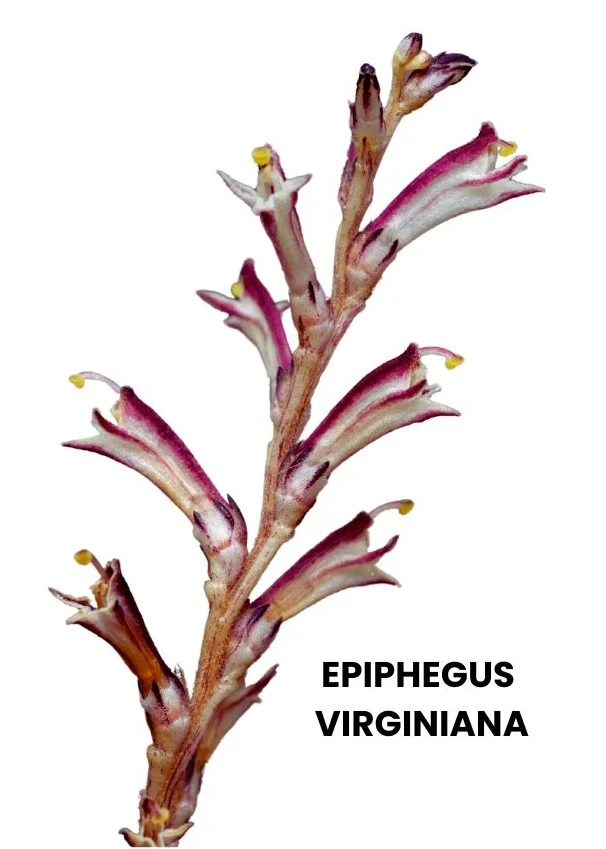Epiphegus Virginiana, commonly known as Beechdrop, is a homeopathic remedy primarily used to treat headaches, particularly those that are neurasthenic or nervous in nature.
This remedy is especially beneficial for women who experience headaches triggered by exertion, shopping, or deviation from their usual activities.

Table of Contents
ToggleSOURCE INFORMATION
Scientific Classification
- Kingdom: Plantae
- Clade: Angiosperms
- Clade: Eudicots
- Order: Lamiales
- Family: Orobanchaceae
- Genus: Epifagus
- Species: Epifagus virginiana
Common Names
- English: Beechdrop
- Synonyms: Orobanche virginiana
Origin and Distribution
- Native Habitat: Epiphegus virginiana is native to eastern North America, particularly found in deciduous forests where it parasitizes the roots of American beech trees (Fagus grandifolia).
- It has a specialized parasitic relationship with the beech tree, deriving nutrients from its host.
Historical and Medicinal Uses
- Traditional Use: Historically, Native American tribes and early European settlers used Beechdrop for various medicinal purposes.
- It was primarily employed for treating headaches, digestive issues, and menstrual problems.
- Medicinal Properties: In homeopathy, Epiphegus virginiana is recognized for its efficacy in treating specific types of headaches, especially those exacerbated by exertion or mental strain.
- It is also indicated for conditions involving digestive discomfort and menstrual pain associated with congestion.
Description
- Plant Description: Beechdrop is a small, non-photosynthetic herbaceous plant that lacks chlorophyll.
- It typically grows to a height of about 20-60 cm (8-24 inches) and has a pale yellowish or brownish stem with small, scale-like leaves.
- Flowers: The flowers are small, tubular, and white to pale pink in colour, arranged in spikes at the base of the plant.
- Habitat: It thrives in shaded areas under beech trees, where it forms dense clusters near the roots of its host.
Homeopathic Use
- Indications: In homeopathy, Epiphegus virginiana is used primarily for headaches that are neurasthenic or nervous in nature, worsened by exertion, shopping, or deviation from routine activities.
- It is also employed for digestive disturbances and menstrual disorders associated with congestion.
- Symptom Profile: The remedy profile includes pressing pains in the temples, salivation, bitter taste in the mouth, and aggravation from working in open air.
DRUG PATHOGENESIS
- Epiphegus Virginiana acts on the nervous system and is particularly effective in addressing headaches that arise from mental or physical exhaustion.
- It targets symptoms that are exacerbated by exertion and stress, providing relief for individuals who are prone to headaches under these conditions.
KEY CHARACTERISTICS
HEAD
- Pain: Pressing pain in the temples, felt from the outside inwards, with a predominance on the left side.
- Sick Headache: Headaches that occur when deviating from normal routines or pursuits.
- Nerve Tire Headaches: Headaches resulting from mental or physical exhaustion, often preceded by hunger.
- Salivation: Viscid salivation with a constant need to spit.
TONGUE AND TASTE
- Coating: Yellow-coated tongue.
- Taste: Bitter taste in the mouth.
DIGESTIVE SYSTEM
- After Meals: Drowsiness after eating.
- Stools: Loose stools.
REPRODUCTIVE SYSTEM
- Subinvolution: Associated with painful menstruation and congestion.
MODALITIES
- Aggravation: Symptoms worsen from working in open air.
- Amelioration: Symptoms improve with sleep.
WHAT ARE MODALITIES IN HOMOEOPATHY?
RELATIONSHIP WITH OTHER DRUGS
Comparative Remedies,
- Iris: For headaches with digestive disturbances.
- Melilotus: For congestive headaches and migraines.
- Sanguinaria: For right-sided headaches and migraines.
- Fagus (Beech-nuts): Associated with headache, salivation, swelling in the mouth, and a dread of water.
DOSE
- Potency Range: First to thirtieth potency.
Frequently Asked Questions
What conditions does Epiphegus Virginiana treat?
- It primarily treats headaches, especially those caused by mental or physical exertion.
- It is also used for digestive issues and menstrual problems.
How should Epiphegus Virginiana be taken?
- It is typically administered in homeopathic potencies ranging from the first to the thirtieth potency.
- The specific dosage and frequency should be determined by a qualified homeopath.
Are there any side effects?
- Homeopathic remedies are generally considered safe and have minimal side effects.
- However, it is essential to consult with a healthcare provider before starting any new treatment.
Can Epiphegus Virginiana be used for other types of headaches?
- While it is primarily indicated for exertion-induced headaches, it may also provide relief for other headache types, depending on the individual’s symptoms and overall health condition.
Glossary of Difficult Words
- Neurasthenic: Relating to or suffering from neurasthenia, characterized by chronic fatigue and weakness.
- Subinvolution: The incomplete return of the uterus to its normal size after childbirth.
- Congestion: An excessive accumulation of blood or other fluid in a body part or vessel.
- Potency: In homeopathy, potency refers to the strength of a remedy, determined by the number of times it has been diluted and succussed (shaken).
Epiphegus Virginiana offers a valuable remedy for individuals suffering from specific types of headaches and other related symptoms, providing relief through its targeted action on the nervous and digestive systems.
